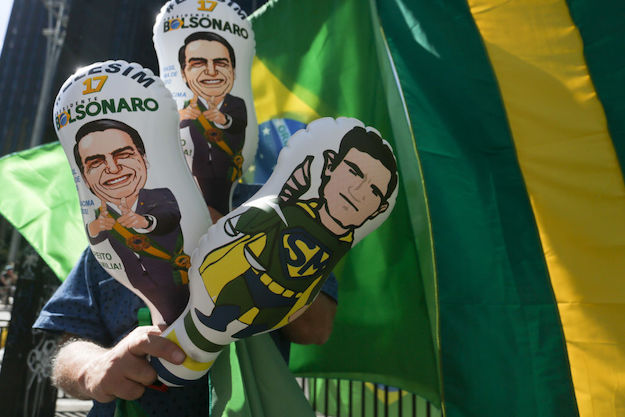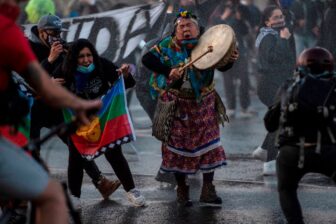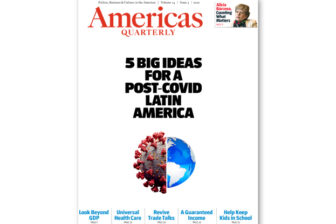RIO DE JANEIRO – Jair Bolsonaro was elected in 2018 as Lava Jato’s anti-establishment champion. His campaign, built on distaste for the Brazilian elite, came four years after the historic anti-corruption probe had begun to lay bare the full web of tawdry connections between the country’s political and economic masters. His pick of Judge Sérgio Moro, the public face of the operation, as justice minister seemed to promise that, if nothing else, the clean-up of Brazilian politics would continue with Bolsonaro as president.
Two years later, Moro has resigned, and the president has essentially ended the operation, claiming “there is no more corruption in my government.” (Ironically, on Wednesday the vice-leader of Bolsonaro’s coalition in the Senate was found with about $5,000 in his underwear during a police raid for suspected embezzlement of COVID-19 funds.) The real reasons Bolsonaro has undone Lava Jato are both personal and political. But while it is too soon to tell what the final legacy will be, the odds that the largest anti-corruption probe in Brazilian history will make good on its early promise of political renewal now look vanishingly slim.
The death of Lava Jato came slowly, then all at once. But key to it all has been Bolsonaro’s pursuit of a comfortable relationship with the establishment figures he so derided during the campaign.
Surfing the anti-establishment wave the operation helped create, Bolsonaro moved against Brazilian institutions in early 2020. He attended demonstrations that called for closing Congress and shutting down the Supreme Court. His son, Eduardo Bolsonaro, a member of Congress who is very influential in his father’s government, said in an interview that a decisive break (“momento de ruptura”) was not a matter of if, but a matter of when. The government is being investigated for running a fake news distribution center (the so-called hate cabinet) that systematically attacked Supreme Court judges and leaders of Congress. Bolsonaro’s former education minister said he wished he could send all Supreme Court judges to prison. The list goes on.
Bolsonaro has also waged war on the press from day one, harassing and threatening journalists. He channeled public advertising expenditures to loyalist media outlets (they used to be allotted according to ratings). Bolsonaro remains, of course, a strong supporter of Brazil’s military dictatorship of 1964-1985, and never made any real effort to disguise his authoritarian plans.
But Brazil’s institutions have proven resilient, to the point that Bolsonaro now sees the need to make amends. Breaking Lava Jato is his way to prove he means business.
Bolsonaro’s appointment of Augusto Aras as inspector general in 2019 is one case in point. Leftist presidents from 2003-2016 deferred to state attorneys general in selecting their inspector general, part of an unwritten rule and a way for presidents to signal that they don’t want to interfere with investigations. After all, one of the jobs of the inspector general could be to investigate the president.
But Aras was not even on the state attorneys’ short list. And since his appointment he has begun to move against Lava Jato. He began his offensive by trying to centralize information about current investigations in his office. Members of the Lava Jato task force protested vehemently, to no avail. Aras also acted to ensure that Deltan Dallagnol, Lava Jato’s star prosecutor, was censured by the national council of federal prosecutors. Under heavy pressure, Dallagnol resigned his position. The entire São Paulo branch of the task force then resigned in protest against Ara’s meddling in current investigations.
The political benefits of these moves for Bolsonaro are not hard to decipher. The São Paulo branch had recently indicted several important center-right politicians. More or less at the same time, center-right parties who had been talking about impeaching Bolsonaro started talking compromise and praising political stability. All this was done in broad daylight, and cost Bolsonaro only a few points in his approval ratings.
The personal benefits of Bolsonaro’s opposition to Lava Jato are clear as well. It should be said that there are good reasons to be skeptical of the operation in 2020 – not least after a series of leaked conversations between task force members, published by The Intercept, put the team’s independence and political disinterest in doubt. But it’s highly unlikely that Bolsonaro’s war on Lava Jato has been inspired by his love of judicial procedure, or his adherence to a sober, Burkean conservatism that abhors revolutionary enthusiasms. He is fighting Lava Jato because he is afraid that he – or his family members – might go to jail.
Shortly after the election, one of Bolsonaro’s sons, Senator Flávio Bolsonaro, was caught running an alleged corruption scheme in Rio de Janeiro. According to the authorities, he used public funds to hire aides that never showed up for work and returned most of their earnings to the Bolsonaros. Some of the checks were deposited in the first lady’s bank account, suggesting that this was not just Flavio’s operation, but a family business.
This likely helps explain another major move the president has taken to end Lava Jato once and for all: his nomination of Kassio Nunes to Brazil’s Supreme Court earlier this month.
When the president was given a chance to make his first Court nomination, hardcore bolsonaristas expected a radical right-winger. Instead, they got Nunes: a conservative but, based on his record, not a radical. Again, the choice comes from Bolsonaro’s realization that a warm relationship with establishment political forces will be a benefit to him in the long run. The Nunes pick came as part of a negotiation between Bolsonaro and the “Centrão” (literally “big center”), a faction of Congress that specializes in selling their support to any government, left or right. (Former President Dilma Rousseff never got along with the Centrão, and it cost her.)
Nunes’ appointment may cause friction with Bolsonaro’s base. But establishment figures are celebrating.
In the end, Lava Jato’s association with Bolsonaro has ended badly for the moral crusaders. The operation is being dismantled in broad daylight, with little opposition. Media support is not what it used to be; Moro’s decision to associate himself with a president who wages war against independent journalism didn’t help.
The costs of Lava Jato’s death will be hard to measure. Low-profile task force members who did nothing wrong will pay for the errors of high-profile members who tried to play politics. The task force squandered much of its moral capital by associating itself with Bolsonaro – the president, in giving Moro a job, outplayed them all.
Corrupt politicians are happy for obvious reasons. The best-case scenario is that the shock to Brazil’s political system created by Lava Jato outlives the process itself. But many honest democrats may also hope that the end of “anti-politics” will bring about a return to normal governance. Lava Jato’s association with a cynic authoritarian like Bolsonaro means that even some sensible, honest people will not cry over the operation’s demise.
—
Barros is a sociologist and political columnist at Folha de São Paulo.








